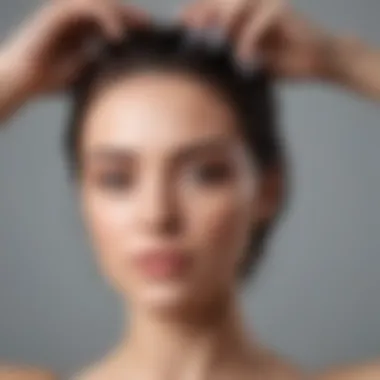Unlocking the Secrets of Hair Rinsing Benefits


Intro
The practice of hair rinsing has emerged as a pivotal aspect in maintaining healthy hair and a robust hair care routine. This method, often overlooked, offers numerous advantages that can rejuvenate and enhance the overall appearance of hair. Understanding the various types of rinses and their specific benefits is essential for women of all ages who desire effective hair care solutions. As we explore the significance of hair rinsing between washes, it is crucial to recognize how this practice interacts with personal hair types, environmental elements, and other hair products.
Incorporating rinses into your routine allows for greater flexibility and can contribute positively to the hair's texture and manageability. As our discussion unfolds, we will analyze the techniques associated with hair rinsing, debunk common myths, and provide tailored recommendations to meet diverse hair needs. This guide aims to create a well-informed approach that seamlessly integrates rinsing into the broader context of hair care.
Prelims
The significance of hair rinsing between washes cannot be overstated in the realm of hair care. As individuals navigate their daily lives, the condition of their hair often reflects both the environment and personal health. Hair rinses serve as a supportive practice that can enhance the overall appearance and feel of hair without the commitment of a full wash. This article aims to dissect the multifaceted benefits of hair rinsing while offering practical techniques for incorporation into varying hair care routines.
The practice of rinsing adds versatility to hair maintenance, bridging the gap between washes. It can combat issues such as buildup from products or excess oil on the scalp. Especially for women who thrive in an active lifestyle, hair rinses can provide much-needed refreshment without stripping natural oils as frequent shampooing might do. The careful selection of rinses based on one's hair type can further personalize and optimize hair care practices.
Moreover, exploring the various types of hair rinses extends the understanding of how different ingredients can yield distinct results. For instance, vinegar rinses may offer clarifying benefits, while herbal rinses can promote scalp wellness. Educating readers about these nuances equips them with the knowledge to make informed choices, thereby improving their hair health effectively.
Hair rinsing also challenges some common misconceptions lurking in the beauty domain. Many may believe that rinses can entirely substitute for cleansing shampoos or may weigh down their hair. This article aims to clarify these doubts, reinforcing professional guidance in hair health.
By diving into the reasons for hair rinsing and its impact on daily routines, this exploration offers insights tailored to women of all ages. From practical advice on techniques to addressing environmental influences on hair, the aim is to provide a comprehensive resource that resonates with every individual seeking to elevate their hair care regimen.
Understanding Hair Rinses
Hair rinses are an often-overlooked aspect of hair care, yet they hold significant value in maintaining the health and appearance of hair. This section delves into the essential characteristics of hair rinses, helping readers to appreciate their function and relevance in everyday routines. By examining what hair rinses are and their objectives, one can better understand how to integrate this practice into their regimen effectively.
Definition of Hair Rinse
A hair rinse refers to a liquid product applied to hair after washing or in between wash days. It is formulated with various ingredients depending on the desired effect, such as cleansing, conditioning, or adding shine. Typically, hair rinses can be homemade or purchased from stores, with various formulations available. Natural ingredients often include apple cider vinegar, herbal extracts, and oils. They are designed to enhance hair's overall health while addressing specific concerns.
Purpose of Hair Rinses
The purpose of hair rinses varies based on individual needs and preferences. However, some of the most common aims include:
- Cleansing: Hair rinses can help remove build-up from product residues and environmental impacts.
- Conditioning: A well-formulated rinse can provide moisture, enhancing hair softness and manageability.
- Shine: Hair rinses can add shine, making hair appear healthier and more vibrant.
- Scalp care: Many rinses support scalp health, maintaining a balanced environment for hair growth.
Incorporating hair rinses into a hair care routine can yield substantial benefits, from promoting cleanliness to enhancing overall appearance. Therefore, understanding hair rinses is essential for those seeking to improve their hair health.
Types of Hair Rinses
Hair rinses play an essential role in enhancing hair care routines. They not only add unique benefits but also prepare the hair for better styling. This section will analyze the various types of hair rinses available, their specific advantages, and considerations for their use. Different rinses can address particular hair needs, making it important to choose the right one based on individual hair types and concerns.
Vinegar Rinses
Vinegar rinses, particularly those made with apple cider vinegar, have gained popularity in recent years. This type of rinse provides a plethora of benefits. It helps to balance the pH of the hair, which is crucial for maintaining a healthy cuticle. When the cuticle is healthy, it lies flat, resulting in shinier and smoother hair. Moreover, vinegar rinses can help remove product buildup, which is often a concern for those using multiple hair products. The acidity also makes it effective against dandruff, promoting a healthier scalp. To prepare a vinegar rinse, one can dilute one part vinegar with two parts water, then follow with a thorough rinse.
Herbal Rinses
Herbal rinses are derived from various plants and can be customized to fit specific hair needs. For instance, chamomile is often touted for its ability to lighten blonde hair naturally, while rosemary can promote scalp circulation and enhance dark tones. These rinses are beneficial for conditioning and can impart additional nutrients to the hair. Making herbal rinses involves steeping dried herbs in hot water and letting it cool before using. Regular use of herbal rinses can contribute to overall hair health and can help those concerned with hair loss or scalp irritation.


Oil Rinses
Oil rinses utilize various oils, such as coconut, olive, or argan oil, to provide deep conditioning. This method is particularly advantageous for dry or damaged hair. Oils can penetrate the hair shaft, leading to improved moisture retention. Regular oil rinsing can reduce frizz and restore elasticity. To perform an oil rinse, one can apply a small amount of oil directly to the hair, focusing on the ends, and leave it for a period before washing it out gently. This technique is simple yet effective for those looking for intense hydration.
Conditioner Rinses
Conditioner rinses are another form of hair rinse that promotes softness and manageability. Using conditioner as a rinse can help in detangling the hair, making it easier to style. It also adds an extra layer of moisture, which is critical in maintaining overall hair health. Applying conditioner as a rinse typically involves working it through the hair after shampooing, leaving it for a few minutes, and then rinsing it out. This approach is suitable for various hair types and is especially helpful for those with coarse or curly hair.
"Selecting an appropriate rinse can significantly impact your hair's overall appearance and health."
In summary, understanding the types of hair rinses available empowers individuals to enhance their hair care routines. By selecting the right rinse, one can target specific hair issues while also enjoying added benefits.
Benefits of Hair Rinsing
The practice of hair rinsing plays a vital role in maintaining healthy hair, particularly between traditional washes. This section discusses various advantages that rinsing offers, showcasing its significance in a holistic hair care routine. From enhancing cleanliness to supporting scalp health, hair rinses provide multiple benefits that cater to the unique needs of different hair types. Recognizing these benefits can help women make informed decisions regarding their hair care practices.
Enhanced Cleanliness
Rinsing hair between washes serves as an effective method to maintain freshness. Daily exposure to pollutants, sweat, and oils can quickly lead to an unclean feeling. Hair rinses provide a way to cleanse the hair without stripping it of necessary oils. Using a gentle hair rinse can effectively remove impurities while refreshing the scalp. This is particularly relevant for those who live in urban environments with high levels of pollution. A simple rinse can help avoid buildup and prolong the time between washes, allowing the scalp to retain its natural balance.
Improved Shine and Softness
Incorporating hair rinses into your routine can significantly impact the appearance and texture of your hair. Rinses containing natural ingredients, like herbal extracts or diluted vinegar, can smooth the hair cuticle, promoting shine. When the cuticles lie flat, light reflects more evenly off the hair’s surface, resulting in a more vibrant look. Moreover, hair rinses can soften the strands, enhancing manageability and reducing frizz. The result is hair that not only looks healthy but feels luxurious to the touch.
Scalp Health
Good scalp health is essential for overall hair vitality. Rinses can help in maintaining a clean and balanced scalp environment. Using a scalp-targeted rinse can alleviate issues such as dryness or excessive oiliness. Ingredients like aloe vera or tea tree oil can be beneficial, as they have soothing and antimicrobial properties. Regular rinsing can keep excess sebum in check, preventing clogged hair follicles, which may impede hair growth. Therefore, benefiting scalp health also supports the overall condition of the hair.
Easier Styling
Women often wrestle with knots and tangles, which can lead to frustration during styling. Hair rinses can aid in minimizing these issues. By using conditioners or specifically designed hair rinses, it becomes easier to detangle hair. This can lead to a smoother styling process and helps to maintain the integrity of the hair. A rinse can add slip to the hair, making it easier to work with during styling and ultimately resulting in less breakage.
"Rinses serve as a bridge between full washes, improving hygiene and hair aesthetics without the harshness of frequent shampooing."
Rinsing hair presents numerous benefits that enhance the hair care routine significantly. Understanding these advantages can empower women to adopt rinsing as a fundamental part of their hair maintenance practices.
Selecting the Right Rinse for Your Hair Type
Choosing the appropriate hair rinse is vital for achieving optimal results from your hair care routines. Each hair type has its unique characteristics that influence how it behaves and interacts with products. By selecting a rinse that caters specifically to your hair's needs, you can enhance its overall health, appearance, and manageability. The right rinse can help in addressing issues like oiliness, dryness, or damage which commonly affect various hair types.
For Oily Hair
Hair that tends to accumulate excess oil can benefit significantly from a more astringent rinse. Vinegar rinses are particularly effective here. The natural acidity of apple cider vinegar helps to eliminate residue and balance the scalp's oil production. To use, mix one part vinegar with three parts water and apply it after shampooing. This rinse can leave your hair feeling refreshed, clean, and light without stripping it of essential moisture. Avoid heavy products after rinsing to maintain the desired lightness.
For Dry Hair


Dry hair often requires nourishment and hydration. A herbal rinse can provide this moisture and also invigorate the scalp. Ingredients like chamomile or calendula, when steeped in hot water and strained, can be effective options. To make this rinse, brew a strong herbal tea, let it cool, and apply it generously after washing your hair. The richness of these herbal benefits promotes softness and reduces the appearance of dry ends, leaving hair looking more vibrant.
For Curly Hair
Curly hair tends to be drier and requires more moisture to maintain its structure. Oil rinses, particularly those using coconut or olive oil, are excellent choices. Applying these oils before shampoo or as a final rinse helps in sealing in hydration and providing a natural shine. When using an oil rinse, apply a small amount of oil throughout your curls, leave it for a while, then proceed with your usual wash. This method creates a protective barrier that helps to define curls without weighing them down.
For Color-Treated Hair
Color-treated hair needs extra care to preserve vibrancy and prevent damage. Conditioner rinses designed specifically for color protection can enhance the longevity of the shade. Look for conditioners infused with ingredients such as argan oil or keratin that are formulated for colored hair. After cleansing, apply the conditioner and allow it to sit for a few minutes before rinsing. This treatment helps to lock in color while keeping the hair soft and manageable, minimizing the risk of fading.
How to Apply Hair Rinses Effectively
Efficient application of hair rinses is crucial for achieving the intended benefits without compromising hair health. This section details how to prepare, apply, and determine the frequency of using hair rinses. These steps ensure that hair rinsing becomes an integral part of the hair care routine, maximizing effects while catering to individual hair types and needs.
Preparation
Preparation is the foundation for effective hair rinsing. It involves gathering all necessary materials and setting the right environment. Here are key aspects to consider:
- Choose Your Rinse: Select a hair rinse suited to your hair type. For instance, if you have oily hair, a vinegar rinse may enhance clarity. Conversely, dry hair often benefits from oil or herbal rinses.
- Dilution: Many rinses, particularly vinegar, need dilution. Mixing it with water reduces acidity, making it gentler on hair. A common ratio is one part vinegar to four parts water.
- Test Patch: Conduct a patch test, especially with new herbal rinses. Apply a small amount to a discreet section to check for adverse reactions. This step prevents potential scalp irritation.
Proper preparation ensures optimal conditions for utilizes the rinses effectively.
Application Techniques
The actual process of applying hair rinses is just as important as the preparation. Effective application involves the following:
- Clean Hair: Start with clean, damp hair. Hair rinses are most effective when applied to freshly washed hair, allowing for better absorption of nutrients.
- Sectioning Hair: Divide hair into sections. This approach allows for even distribution of the rinse. Focus on the scalp and lengths, as different areas may have varying levels of product buildup.
- Gentle Massage: While applying the rinse, use fingers to gently massage the scalp. This promotes blood circulation and enhances absorption. It also allows for a thorough cleanse by breaking down product residue.
- Time it Right: Let the rinse sit for a few minutes. Generally, five to ten minutes is adequate. This waiting period allows the active ingredients to penetrate the hair and scalp effectively.
- Rinse Thoroughly: Ensure to rinse out the mixture with cool water. Cool water helps seal the hair cuticles, adding shine and protecting your hair from damage.
These techniques help in achieving the most benefits from hair rinses.
Frequency of Use
Determining the appropriate frequency for hair rinsing is essential. Overuse can lead to buildup and dryness, while underuse might not yield desired results. Here is a guideline based on hair types:
- Oily Hair: Use hair rinses two to three times a week as a means to cleanse excess oil and refresh the scalp.
- Dry Hair: For dry hair, limit rinses to once a week. This minimizes moisture loss and promotes hydration.
- Curly Hair: Curly hair often thrives with rinses, so applying them once a week helps maintain definition and moisture.
- Color-Treated Hair: If color-treated, use rinses sparingly, about once every two weeks. This protects color vibrancy and prevents fading.
Understanding how often to apply hair rinses can transform hair care routines and enhance hair health while avoiding potential issues.
Remember: Every individual’s hair needs vary. Monitor how your hair reacts to rinses and adjust frequency accordingly.
Common Misconceptions about Hair Rinsing
Understanding common misconceptions about hair rinsing is essential in promoting effective hair care practices. Many people operate under incorrect beliefs that can hinder their hair health. Addressing these misconceptions helps clarify the actual benefits of hair rinses, guiding readers towards better decision-making.
Rinses Can Replace Shampoo


A prevalent myth is that hair rinses can fully replace shampoo in one's hair care routine. While rinses serve a different purpose, they cannot substitute for cleansing the scalp and hair. Shampoo's primary role is to remove dirt, oil, and product buildup. It creates a clean foundation for any additional treatments, such as rinses.
Hair rinses, on the other hand, are designed to enhance the effects of a proper wash. They can provide moisture, shine, and a refreshing feel without removing essential oils. The idea that rinses can take the place of shampoo can lead to unclean hair, which may actually cause scalp health issues over time.
It's crucial to recognize that incorporating hair rinses should be seen as a complement to shampooing rather than a replacement. Using both allows individuals to enjoy the benefits of cleaner, more manageable hair without sacrificing effectiveness.
Rinses Will Weigh Down Hair
Another common belief is that rinses will weigh down the hair, making it look flat or greasy. This misconception can deter many individuals from trying hair rinses, especially those with finer hair types. In reality, the outcome often depends on the type of rinse used and how it is applied.
For example, vinegar rinses may seem heavy, but when diluted adequately, they can actually enhance volume and shine. Conversely, oil rinses might add some weight if used excessively. Thus, the key is to use the right amount and frequency for one's specific hair type. It is also beneficial to select rinsing products that are formulated for your particular hair needs.
"Understanding the correct application of hair rinses can enhance your hair's overall texture and appearance."
In summary, these misconceptions about hair rinsing highlight the need for clarity regarding hair care practices. A balanced hair care approach includes understanding the roles of both shampoo and rinses while being aware of the effects different products can have on various hair types. By debunking these myths, readers become informed and empowered to create effective hair care routines suited to their needs.
Impact of Environmental Factors on Hair Health
The environment plays a crucial role in determining the health of hair. Factors such as humidity and pollution can significantly impact its appearance and vitality. Understanding these influences helps in crafting appropriate hair care routines, particularly in the context of using hair rinses. Hair rinsing can provide some mitigation against these harsh elements, enhancing both the look and feel of hair.
Humidity and its Effects
Humidity is a natural factor that influences hair texture and volume. When the air is filled with moisture, hair tends to absorb this humidity. This absorption can lead to frizz and an overall unmanageable look. For those with curly or wavy hair, high humidity often causes curls to expand and lose their defined shape. Conversely, low humidity can strip moisture from hair, making it dry and brittle.
In high humidity conditions, consider using lighter hair rinses, such as herbal rinses. These rinses rarely weigh down the hair, allowing it to maintain some structure while still profiting from the beneficial ingredients. Using rinses with moisturizing properties can help in retaining softness and gloss. It's essential to select products that cater to your specific hair needs for the best results.
Pollution Considerations
Urban environments expose hair to various pollutants which can lead to dullness and damage. Dust, smoke, and chemicals in the air can accumulate on hair, making it look lifeless. The scalp can also suffer from irritation and buildup, which affects the overall health of the hair beneath.
A good strategy against pollution is to include clarifying rinses in your hair care routine. Vinegar rinses, for instance, can remove residue and refresh the scalp. They work by breaking down buildup, making hair feel cleaner and look brighter. Regular use of a hair rinse that is tailored to combat these environmental impurities can also nurture the scalp, promoting healthier hair growth.
Prolonged exposure to environmental factors can lead to problems with hair vitality, emphasizing the need for attentive care.
By understanding how both humidity and pollution affect hair, women can personalize their hair care solutions. Simple adjustments, such as using targeted hair rinses, can empower individuals to significantly enhance their hair's resilience in the face of environmental challenges.
Culmination
In this article, we have explored the significance of hair rinsing between washes, demonstrating its relevance in modern hair care routines. The importance of hair rinsing cannot be understated, as it offers numerous benefits that can enhance the overall health and appearance of hair.
First, hair rinses contribute to enhanced cleanliness. This practice helps to remove residue from styling products and environmental pollutants that accumulate on the hair and scalp. By incorporating rinses into your routine, you can maintain a refreshing and clean feeling without excessive shampooing.
Second, hair rinsing improves shine and softness. Regularly using the right type of rinse can restore moisture and nutrients, leading to shinier and more manageable hair. This is particularly crucial for women who style their hair often, as the right rinses can counteract damage from heat and products.
Scalp health is another advantage of hair rinsing. Proper rinsing helps maintain a balanced scalp environment, reducing issues such as itchiness or flakiness. A healthy scalp serves as a foundation for strong hair growth, which is vital for individuals aiming for long and healthy locks.
Moreover, hair rinses facilitate easier styling. By providing a lightweight layer of conditioning, rinses ensure that hair is more pliable and ready for styling, saving time and effort.
Finally, selecting the proper rinse for specific hair types is essential. Whether you have oily, dry, curly, or color-treated hair, the correct rinse can enhance your hair’s texture and health.
Hair rinsing is more than a supplementary step; it's a vital component of a comprehensive hair care routine that addresses multiple challenges of hair management.



